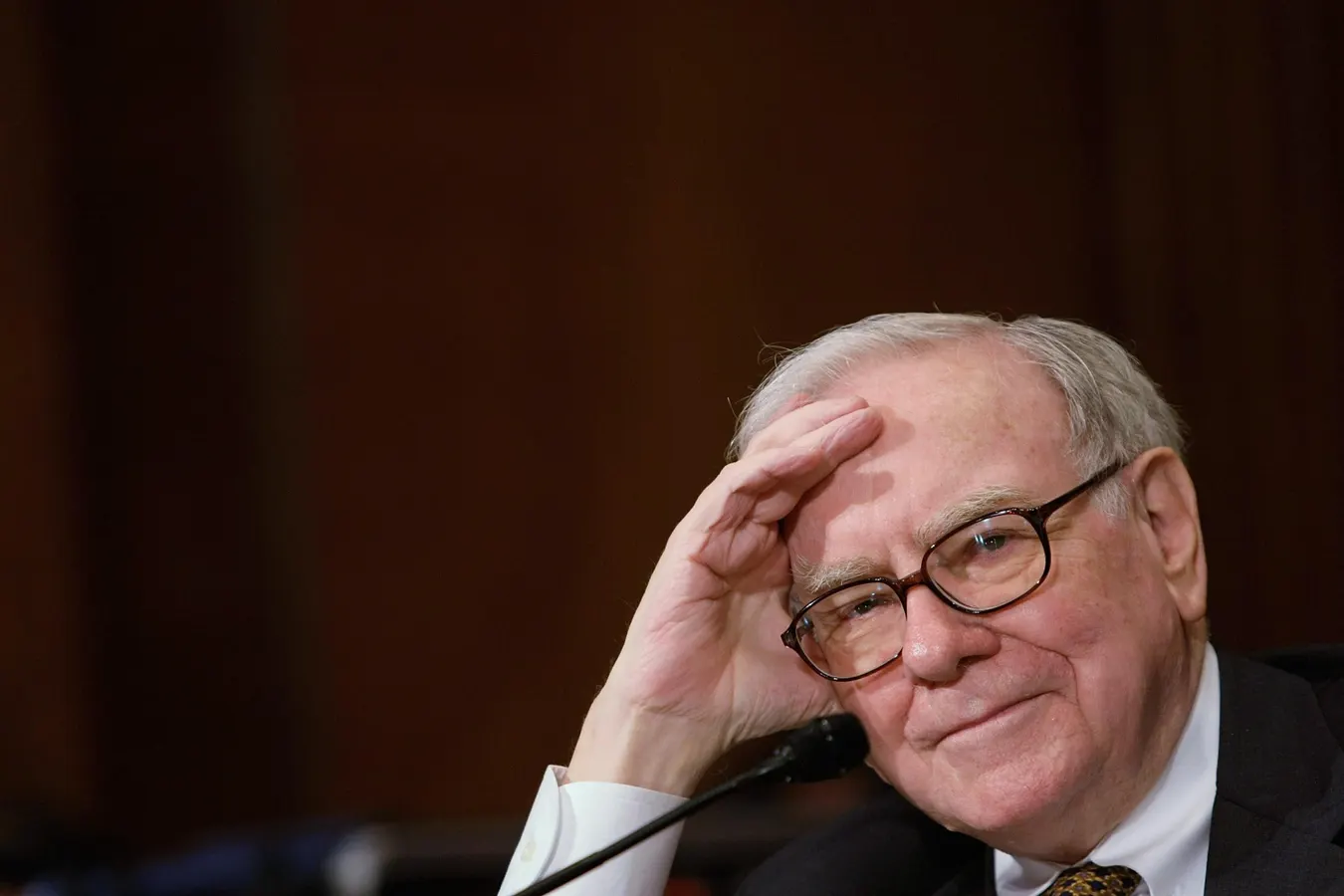By Alex Wong,Bill Stone,Contributor
Copyright forbes

Warren Buffett’s next move: How Berkshire Hathaway is navigating falling rates, housing headwinds, and market uncertainty. (Photo by Alex Wong/Getty Images)
Getty Images
“As for the future, Berkshire will always hold a boatload of cash and U.S. Treasury bills along with a wide array of businesses.” – Warren Buffett in his 2022 Berkshire Hathaway Annual Letter
The September rate cut from the Federal Reserve (Fed) likely marks the beginning of a new series of cuts, which could continue to send short-term bond yields lower. The yield on US 3-month bills has fallen from a high of 5.51% in October 2023 to 3.95% last Friday. If the Fed continues to lower the monetary policy rate in an attempt to support the job market and the economy, this yield should continue to decline.
Cash Yields
Glenview Trust, Bloomberg
Berkshire’s Cash Hoard
As of Berkshire Hathaway’s (BRK/A, BRK/B) second-quarter earnings report, Berkshire had about $344 billion in cash, with the majority in US Treasury bills. According to Barron’s, “Berkshire has the most cash of any U.S. nonbank company by a wide margin.”
Berkshire Hathaway: Cash
Glenview Trust, Bloomberg
MORE FOR YOU
Income from Berkshire’s investments, which includes the interest on the cash, was over 30% of operating earnings in the second quarter. Assuming no change in cash levels, Barron’s estimates that a one percentage point reduction in short-term yields could reduce Berkshire’s after-tax operating profit by $2.5 billion. To put that decline into perspective, Berkshire had operating earnings of $47.4 billion in 2024, so it could be a headwind of about 5% of operating profits.
Berkshire Hathaway: 2Q 2025 Operating Earnings
Glenview Trust, Bloomberg
Second-Order Effects On Berkshire Hathaway
“Despite what some commentators currently view as an extraordinary cash position at Berkshire, the great majority of your money remains in equities. That preference won’t change. While our ownership in marketable equities moved downward last year from $354 billion to $272 billion, the value of our non-quoted controlled equities increased somewhat and remains far greater than the value of the marketable portfolio.” – Warren Buffett in his 2022 Berkshire Hathaway Annual Letter
Beyond the first-order effects of lower rates, long-term investors should consider the second-order impacts. As Buffett noted in the quote above, Berkshire still has more exposure to stocks than cash.
Insurance Investment Portfolio: $502.7 Billion
Glenview Trust, Bloomberg, Berkshire Hathaway
Examining the long-term history of short-term yields reveals instances where the Fed successfully averted a recession by lowering the monetary policy rate to stimulate the economy. Stocks typically benefit during these periods, as corporate earnings are expected to continue growing. Berkshire’s mix of publicly-traded and wholly-owned companies should do quite well if the economy continues to perform well.
History Of Cash Yields
Glenview Trust, Bloomberg
Berkshire’s Housing Sector Exposure
One of the more moribund sectors of the US economy in recent years has been housing. The combination of building materials inflation and higher mortgage rates has sent US affordability to near the worst levels.
Housing: Mortgage Rates & Affordability
Glenview Trust, Bloomberg
New and existing home sales have been generally flat in the post-pandemic period, hampered by the higher mortgage rates and costs.
Glenview Trust, Bloomberg
Berkshire Hathaway has significant exposure to the housing sector through both the manufacturing and retailing segments. For example, the manufacturing sector includes several building products companies, such as Shaw Flooring and Benjamin Moore Paints. Revenue from building products should be about 8% of Berkshire Hathaway’s overall sales in 2025. This exposure represents a significant portion of overall sales, despite building product sales being expected to be 7% below 2022 levels.
Berkshire Hathaway: 2Q 2025 Revenue
Glenview Trust, Bloomberg
If the Fed rate cuts can continue to send mortgage rates lower and stimulate the housing market, Berkshire will see the benefits.
Looking At The Dark Side
While the markets are currently pricing in a high likelihood that the Fed can steer the US economy around any significant downturn, there are never any guarantees. There have been numerous periods in the past when a recession occurred despite lower short-term interest rates.
Stocks & Recession
Glenview Trust, Bloomberg
The median decline in stocks surrounding a recession has been 24%, but it has been as severe as a 57% decline.
S&P 500 Returns Associated With Recession
Glenview Trust, Bloomberg
Warren Buffett, through Berkshire Hathaway, has historically benefited from these challenging market periods in the long term, as the company’s extensive cash holdings enable it to snap up bargains. In contrast, other companies struggle to survive the turmoil.
Berkshire Hathaway Stock Performance
Berkshire’s stock has lagged in total return year-to-date, gaining 10% versus the S&P 500’s 14%. Some of this performance could be attributed to concerns about the earnings impact from lower rates. Still, it is more likely that the lack of exposure to technology and artificial intelligence, outside of the sizable Apple (AAPL) holdings, is a hindrance. Furthermore, Berkshire tends to benefit when investors seek safety, and this has been the opposite situation since the peak of tariff worries passed in May.
The price-to-book ratio remains a reasonable proxy for gauging Berkshire’s intrinsic value. Berkshire’s stock reached an elevated 1.8 times book in May 2025, as investors sought shelter from the economic concerns after the US tariff announcements.
The stock repurchases in the first quarter of 2024 were likely done at around 1.4-1.5 times book value, so Berkshire’s valuation is nearing a level where repurchases might restart. Share repurchases of Berkshire stock had been off the table at the elevated valuations. Still, an additional lever for Buffett to create value might soon return and provide support for the stock even if the stock market corrects.
Berkshire Hathaway: Valuation
Glenview Trust, Bloomberg
Although it is notable for its substantial cash holdings, Berkshire provides a valuable example of how to approach valuing companies in general. A simple one variable of short-term bond yields doesn’t offer the complete picture of considerations. All other things equal, lower yields should boost stock valuations. In reality, it is never just one variable that changes; instead, multiple variables often interact to produce a change.
“However, I am not willing to incur risk of substantial permanent capital loss in seeking to better long term performance. To be perfectly clear – under our policy of concentration of holdings, partners should be completely prepared for periods of substantial underperformance (far more likely in sharply rising markets) to offset the occasional over performance such as we have experienced in 1965 and 1966, and as a price we pay for hoped-for good long term performance.” – Warren Buffett in his 1966 Buffett Partnership Annual Letter
Stocks are currently pricing in a low likelihood of a recession in the near future, and fundamentals still support this view. The fundamental upside opportunity for a company’s stock price should always be considered in conjunction with the downside risk. On this metric, Berkshire’s stock remains worthy of consideration for investor portfolios despite the likely headwind to earnings from lower short-term US Treasury yields.
Glenview Trust holds Berkshire Hathaway (BRK/A, BRK/B) and other stocks mentioned in this article within its recommended investment strategies. I am a long-time Berkshire Hathaway shareholder and worked for Salomon Brothers when Warren Buffett became Chairman and CEO.
Editorial StandardsReprints & Permissions



